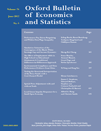
OXFORD BULLETIN OF ECONOMICS AND STATISTICS
Scope & Guideline
Elevating the discourse in economics and statistical analysis.
Introduction
Aims and Scopes
- Economic Growth and Development:
Research exploring the factors influencing economic growth, including state capacity, technology, and global competition. It often employs econometric models to analyze growth trajectories across different regions. - Labor Economics and Employment Dynamics:
Studies examining labor market trends, including employment participation, wage disparities, and the impact of policies on labor dynamics. This includes analyses of demographic influences and economic shocks on labor outcomes. - Monetary Policy and Financial Markets:
Investigations into the effectiveness of monetary policies in various environments, particularly under low-interest rates. This includes assessments of financial market responses to economic changes and policy decisions. - Statistical Methods and Econometric Modelling:
Development and application of advanced statistical techniques and econometric models to analyze economic data. This includes innovations in Bayesian estimation, panel data models, and forecasting methodologies. - Environmental Economics and Sustainability:
Research addressing the intersection of economic activities and environmental sustainability, including the impacts of climate change and resource utilization on economic performance. - Public Policy and Economic Implications:
Analysis of public policies, including fiscal measures and their socio-economic impacts, particularly in the context of crises such as pandemics or natural disasters.
Trending and Emerging
- Impact of Technological Change:
Increasing attention is being paid to how technological advancements affect labor markets, productivity, and economic inequality, reflecting broader societal changes and challenges. - Global Economic Interdependencies:
Research focusing on the interconnectedness of global economies, including the effects of supply chain disruptions and international trade dynamics, is gaining prominence. - Behavioral Economics and Decision-Making:
There is a growing interest in understanding how psychological factors influence economic decisions, leading to more nuanced insights into consumer behavior and policy effectiveness. - Climate Change and Economic Policy:
Studies examining the economic implications of climate change and the role of policy in mitigating its effects are becoming increasingly relevant, as sustainability becomes a critical area of focus. - Data-Driven Decision Making:
The use of big data and advanced analytics in economic research is on the rise, enabling more accurate predictions and deeper insights into economic phenomena.
Declining or Waning
- Traditional Macroeconomic Models:
There has been a decline in the publication of papers focusing on traditional macroeconomic models without incorporating new methodologies or data sources, as researchers seek more innovative approaches. - Single-Country Case Studies:
Papers focused solely on single-country analyses are becoming less common, with a shift towards comparative studies or broader regional analyses that provide more comprehensive insights. - Theoretical Frameworks without Empirical Validation:
Research that emphasizes theoretical discussions without robust empirical backing is less prevalent, as the journal increasingly favors studies that integrate theory with empirical evidence. - Static Economic Analysis:
Static models that do not account for dynamic changes in economic variables are waning, as there is a greater emphasis on dynamic modeling that reflects real-time economic conditions. - Generalized Discussion of Inequality:
While inequality remains a crucial topic, discussions that lack specific empirical analysis or focus on broader narratives are declining, replaced by studies that provide detailed quantitative assessments.
Similar Journals
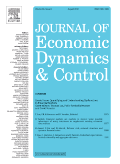
JOURNAL OF ECONOMIC DYNAMICS & CONTROL
Harnessing Knowledge for Real-World Economic ApplicationsJOURNAL OF ECONOMIC DYNAMICS & CONTROL, published by Elsevier, is a distinguished scholarly journal that has established itself as a leading outlet in the fields of applied mathematics, control and optimization, and economics and econometrics since its inception in 1979. With its notable Q1 categorization in 2023 across these disciplines, this journal provides a platform for innovative research that propels theory and practice in dynamic systems and control processes. Researchers, professionals, and students can engage with cutting-edge studies that explore complex economic models and their real-world applications. Although the journal does not offer open access, it remains a vital resource for those aiming to stay informed of the latest advancements in economic dynamics and control methodologies. The journal’s commitment to high-quality research and its impressive standing—ranked in the top percentiles within Scopus categories—underscore its importance and influence within the academic community.
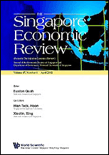
SINGAPORE ECONOMIC REVIEW
Navigating the complexities of economics and econometrics.SINGAPORE ECONOMIC REVIEW, published by WORLD SCIENTIFIC PUBL CO PTE LTD, stands as a prominent platform for research in the fields of economics and econometrics since its inception in 1983. With an ISSN of 0217-5908 and an E-ISSN of 1793-6837, this journal caters to a diverse audience by presenting high-quality, rigorously reviewed articles that address pressing economic issues both in Singapore and globally. Currently classified in the Q3 category for Economics and Econometrics for 2023, it ranks #265 out of 716 in Scopus, placing it in the 63rd percentile among economic journals. Although not open access, the articles published here contribute valuable insights into the evolving dynamics of economic theory and practice, making it an essential resource for researchers, educators, and policymakers alike. The journal's commitment to advancing economic research continues to foster dialogue and inspire innovative approaches within the academic community.
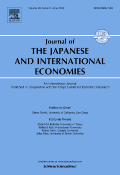
JOURNAL OF THE JAPANESE AND INTERNATIONAL ECONOMIES
Exploring Economic Dynamics Beyond BordersJOURNAL OF THE JAPANESE AND INTERNATIONAL ECONOMIES, a prestigious publication from Academic Press Inc. Elsevier Science, has been a vital contributor to the fields of economics, finance, and political science since its inception in 1987. With an impressive impact factor and recognized within the Q2 category for Economics and Econometrics as well as Finance, and Q1 for Political Science and International Relations, this journal serves as a critical platform for peer-reviewed research that influences both academic discourse and policy-making. The journal is indexed in Scopus, evidencing its prominent position within the scholarly community, with notable rankings of #56 in Political Science and #72 in Finance. Authors and researchers are encouraged to submit their work, contributing to the rich tapestry of knowledge surrounding the economic dynamics of Japan and the broader international landscape. Though it does not offer open access, the journal's subscription model ensures a wide dissemination of its impactful articles, making it essential reading for those aimed at deepening their understanding of economic interrelations and current global issues.
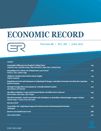
ECONOMIC RECORD
Pioneering Research in Economics and EconometricsECONOMIC RECORD is a distinguished academic journal published by Wiley that has been a vital resource in the field of economics since its inception in 1925. With a focus on disseminating high-quality research, the journal covers a broad range of topics within economics and econometrics, making it an essential platform for scholars, professionals, and students alike. Although it currently does not offer open access, the journal is indexed in leading databases and maintains a respectable Q3 category ranking in the Economics and Econometrics field for 2023. The publication operates on a biennial timeline, continuing to contribute significantly to the literature from 1934 to 2024. Researchers will find its rigorous peer-review process ensures that only impactful studies are included, providing a reliable source for current trends and advancements in economic theory and practice. Located in the United Kingdom, ECONOMIC RECORD is dedicated to fostering an environment of academic excellence and innovation in the economics discipline.
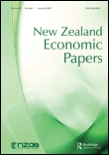
New Zealand Economic Papers
Connecting theory and practice in the realm of New Zealand economics.New Zealand Economic Papers is a prominent academic journal dedicated to the field of economics, published by Taylor & Francis Ltd. With its ISSN 0077-9954 and E-ISSN 1943-4863, this journal has been a significant contributor to economic discourse since its inception in 1966, continuing to provide valuable insights through to 2024. As part of the third quartile (Q3) in the Economics, Econometrics and Finance category, it ranks at #165 out of 288 in Scopus, placing it within the 42nd percentile, demonstrating its respectable impact in the academic community. Although the journal does not offer open access, it remains a vital resource for researchers, professionals, and students interested in understanding economic dynamics, policy analysis, and applied econometrics, particularly in the context of New Zealand. The journal's commitment to rigorous research ensures that it continues to play a crucial role in shaping economic policy and academic thought across the globe.
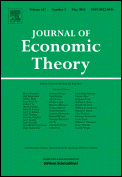
JOURNAL OF ECONOMIC THEORY
Transforming Ideas into Economic ExcellenceThe JOURNAL OF ECONOMIC THEORY, published by Academic Press Inc Elsevier Science, stands as a paramount platform for disseminating groundbreaking research within the field of economics and econometrics. With an impressive history dating back to 1969 and a convergence period extending to 2024, this journal has continually shaped the academic discourse around critical economic theories and methodologies. Currently recognized in the top quartile (Q1) of its category for 2023, it ranks prominently among its peers, boasting an impactful scholarly contribution reflected in its Scopus ranking—positioned at #348 out of 716 journals in the domain. Although it does not offer Open Access, the journal provides an essential resource for those seeking to enhance their understanding of complex economic models and strategies. Researchers, professionals, and students alike will find the JOURNAL OF ECONOMIC THEORY to be an invaluable asset for their academic and professional pursuits in the rapidly evolving landscape of economics.

Annals of Economics and Finance
Fostering Critical Discourse in Economics and Finance.Annals of Economics and Finance is an esteemed academic journal published by Wuhan University Journals Press, focusing on the fields of Economics and Finance. Established in 2000, this journal serves as a platform for scholars to disseminate their research findings and insights, contributing to the development of these disciplines through rigorous peer-reviewed articles. Despite currently holding a Q4 ranking in both Economics and Econometrics and Finance categories (2023), it strives to enhance its impact on the academic community and policy-making audiences. While not Open Access, the journal seeks to cultivate a deeper understanding of vital economic theories and financial practices, thereby offering invaluable resources for researchers, professionals, and students alike. With its broad scope, the Annals of Economics and Finance is poised to play a crucial role in shaping contemporary economic discourse up to 2024 and beyond.
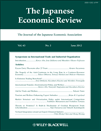
JAPANESE ECONOMIC REVIEW
Illuminating trends in Japanese economics for global impact.Japanese Economic Review, published by Springer Heidelberg, is a renowned academic journal that aims to advance the understanding of economic processes within the context of Japan and the Asia-Pacific region. With an ISSN of 1352-4739 and E-ISSN of 1468-5876, this journal features high-quality research articles that span a broad range of topics in economics and econometrics. Ranked in the Q2 category for Economics and Econometrics as of 2023, it holds a Scopus rank of #332 out of 716, placing it in the 53rd percentile among its peers. Although not Open Access, the journal invites contributions that provide insights and empirical analyses beneficial to both academics and practitioners. Emphasizing a deep understanding of economic dynamics, the Japanese Economic Review is essential reading for anyone interested in the implications of economic policies and trends, making it a significant platform for scholarly dialogue and research dissemination.
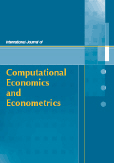
International Journal of Computational Economics and Econometrics
Pioneering the future of economics with cutting-edge computational methodologies.International Journal of Computational Economics and Econometrics is a peer-reviewed academic journal published by INDERSCIENCE ENTERPRISES LTD, focusing on the intersection of computational methodologies and economic analysis. With an ISSN of 1757-1170 and an E-ISSN of 1757-1189, this journal provides a crucial platform for researchers and professionals interested in innovative computational approaches to tackle real-world economic problems. While it currently does not operate under an open-access model, the journal is committed to advancing knowledge in its field, particularly as it occupies a vital niche within Computer Science Applications and Economics and Econometrics, ranking in the Q4 quartile for both categories as of 2023. Covering the period from 2017 to 2024, the journal aims to foster interdisciplinary collaboration and encourage the integration of advanced computational techniques into traditional economic theory and practice. As it continues to evolve, the International Journal of Computational Economics and Econometrics remains essential for academics and practitioners looking to stay at the forefront of technological innovations in economics.
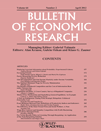
BULLETIN OF ECONOMIC RESEARCH
Connecting Scholars to Innovative Economic IdeasBULLETIN OF ECONOMIC RESEARCH is a premier academic journal published by WILEY, dedicated to the dissemination of high-quality research in the field of economics and econometrics. Established in 1948, the journal has a rich history of contributing to the scholarly dialogue surrounding economic theory and practice, making it an essential resource for researchers, professionals, and students alike. With an impressive impact factor and ranked in the Q3 category for 2023, the journal publishes original research articles, reviews, and theoretical discussions that reflect current trends and developments in the field. Despite not being an open-access journal, it offers numerous access options through institutional subscriptions, ensuring wide dissemination of its impactful content. Aiming to foster a deeper understanding of economic issues, the BULLETIN OF ECONOMIC RESEARCH serves as a vital platform for ongoing scholarly debate and innovation in economic thought.